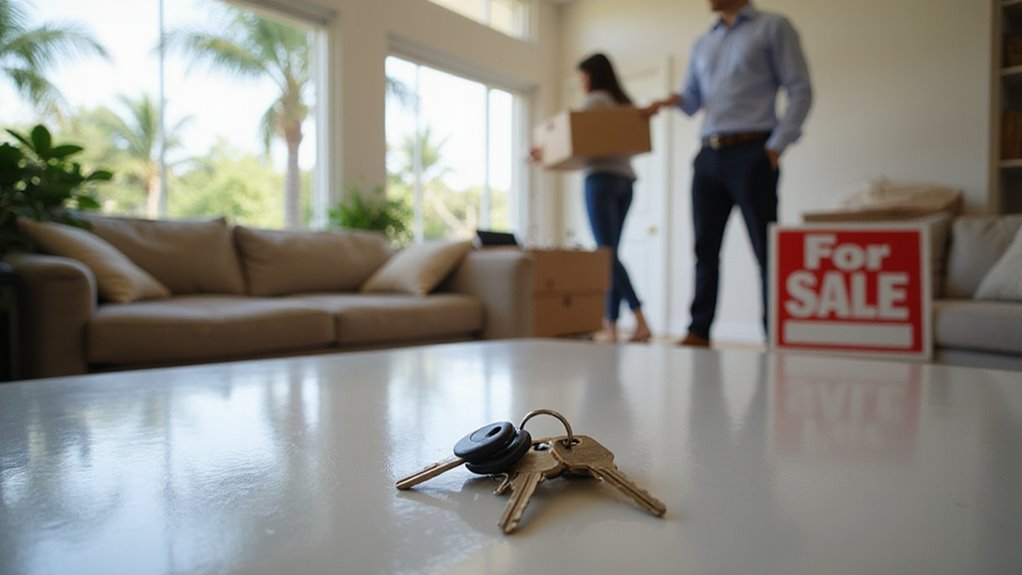Selling a rental property quickly in Florida can feel overwhelming. Owners often worry about slow sales, complicated laws, and tenant issues. Many fear their property might sit on the market for months, costing them money.
These concerns grow when tenants live in the property or if the market shifts. Legal steps and negotiations can delay your plans. You may feel stuck between following the rules and getting top dollar fast.
Yes, you can sell a rental property fast in Florida if you use the right strategy. A focused approach helps you overcome legal and market hurdles. You can sell swiftly, even with tenants or special buyer needs. This blog will guide you step by step, making your rental sale faster and easier.
Key Takeaways
- Notify tenants in writing and follow Florida law for lease terminations or transfers to avoid legal delays.
- Clean, repair, and stage the property to maximize buyer appeal and enable faster sales.
- Set a competitive asking price using recent comparable sales and current market data.
- Market aggressively on platforms like Zillow and Facebook, using professional photos and highlighting rental income potential.
- Consider selling to cash buyers or investors for a quicker, less complicated closing process.
Understanding Florida’s Rental Property Laws

Florida has specific laws for rental properties that landlords must follow. These include rules about security deposits, tenant notifications, and lease changes. Knowing these laws can help you avoid legal problems. A clear title is also crucial for a successful property transaction, as it ensures there are no legal issues affecting ownership that could delay or block your sale.
Landlords must give tenants written notice before selling a property. Florida law also sets timelines for ending or transferring a lease. Following these steps protects your rental income and helps prevent disputes.
If you mishandle deposits or give improper notice, legal issues can arise. The Florida Department of Business & Professional Regulation reports that these are common causes of complaints. Staying informed allows you to sell your property smoothly.
It’s also important to disclose termite damage if it exists, as transparency about property condition is critical for a legal and trustworthy sale.
Evaluating Your Lease Agreements
Start by carefully reading your lease agreements. Look for terms about ending the lease, notice periods, and penalties. Understanding these details helps you avoid problems when selling your property.
Check if your agreements mention automatic renewals. Buyers may ask about your tenant screening process, including payment history and lease compliance. Good screening records can make your property more attractive to buyers. It’s also beneficial to highlight unique features of your rental when discussing with potential buyers, as this can help your property stand out in a competitive market.
Make sure your leases follow current Florida laws. If you find old or unclear terms, update them right away. Fixing these issues now can help prevent delays during the sale.
When preparing your property for sale, keep in mind that cash buyers buy homes as-is, so you don’t need to spend extra money on repairs or upgrades before listing.
Deciding Whether to Sell With or Without Tenants

When you’re ready to sell, you’ll need to weigh the advantages of listing your property with tenants in place against the benefits of delivering it vacant. Properties with tenants can attract investors seeking immediate rental income, while vacant homes often appeal to buyers looking for a primary residence and allow for easier showings. It’s critical to understand Florida’s legal requirements regarding tenant rights and proper notice before making your decision.
Additionally, selling to cash buyers can streamline the process, offering a faster closing and reducing the complications that sometimes arise with tenant-occupied sales. You should also factor in transfer taxes that may be owed at closing, as these can vary by location in Florida and affect your net proceeds from the sale.
Pros of Selling Occupied
Selling a rental property with tenants in place has several advantages. It attracts investors who want instant rental income. Properties with tenants often sell faster and at higher prices than empty ones.
If you keep tenants, you avoid problems like vandalism or squatting in a vacant property. Owners also save money by not paying for an empty home during the selling process. Florida law lets buyers take over existing leases, which avoids complicated evictions.
This situation is attractive to experienced buyers looking for a ready investment. If you want a smooth sale, having tenants can help make your property stand out. In a competitive market, a leased property can sell more easily and with fewer risks.
Benefits of Vacant Property
A vacant property can sell faster and more easily than one with tenants. Buyers can visit anytime, and repairs or staging are simple to arrange. If a home is empty, buyers may picture their own belongings in the space.
Vacant homes avoid problems with renters, such as scheduling showings or dealing with leases. This can help prevent delays during the sale process. Owners often see fewer complications and smoother negotiations.
If you list a move-in-ready vacant property, it can attract more buyers. This may result in a quicker sale and a simpler closing. If you want to avoid hassles, listing a vacant home could be a smart choice.
Legal Considerations With Tenants
If you want to sell a rental property in Florida with tenants, you must follow certain legal rules. Florida law protects tenants, so you cannot end a lease just because you want to sell. The current lease must stay in place unless both you and the tenant agree to end it early.
A fixed-term lease means the tenant can stay until the end date unless both parties agree otherwise. Some landlords offer money to tenants to leave early. If a tenant rents month-to-month, you must give at least 15 days’ written notice to end the lease.
Selling with tenants can attract investors who want rental income right away. Vacant homes may interest buyers who want to move in themselves. Always give proper notice and respect tenant rights.
If you are unsure about the laws, you should talk to a lawyer. Legal advice can help you avoid mistakes and follow Florida statutes. Proper planning can make the selling process smoother.
Communicating Effectively With Your Tenants

You need to notify your tenants of the sale as early as possible—Florida law requires written notice, and clear communication helps maintain cooperation. Coordinate showings with respect for your tenants’ schedules to minimize disruptions and reduce vacancy risk. Strategic, transparent communication increases tenant compliance and can speed up your sale.
Additionally, preparing your property by addressing noticeable issues before showings can make a positive impression on both tenants and potential buyers. If you are selling to a cash buyer, you may be able to streamline the process and close on your timeline, making coordination with tenants even more efficient.
Notifying Tenants of Sale
You must notify your tenants if you plan to sell your property. In Florida, written notice is required by law. Always check the lease and state laws for the correct notice period.
If you need to show the property, you usually must give at least 24 hours’ notice. If you are ending the lease, a longer notice may be needed. Missing these steps can delay your sale or cause legal issues.
Early notice helps tenants get ready and makes them more likely to cooperate. Always keep your communication clear and in writing. This protects you and builds good relations with your tenants.
Coordinating Showings Respectfully
Coordinating showings for a property sale should always respect tenants’ schedules and privacy. Owners must communicate clearly and give tenants enough notice. Good coordination helps the property sell faster and keeps tenants cooperative.
Owners should give at least 24–48 hours’ notice before each showing. This allows tenants to adjust their plans if needed. If tenants have pets, owners should explain pet-friendly policies during showings.
Owners can mention neighborhood amenities when setting up showings. Scheduling during quiet times or local events can make the area look more appealing. If owners offer evening or weekend showings, buyers may have more chances to visit.
Respectful coordination keeps tenants comfortable and reduces stress. Happy tenants may help show the property in the best light. This approach helps maintain good relationships and makes the sale process smoother.
Preparing the Property for Showings
Preparing your property for showings helps attract buyers and get better offers. Clean and repair the home before listing it. Make sure everything works and looks neat. A clean, well-maintained home attracts more buyers and better offers when it’s time to show and sell your property.
You should fix any visible damage and check that appliances work. Fresh paint can make rooms look newer and brighter. If the property looks well-kept, buyers may see it as more valuable. Setting a reasonable price from the start can further increase buyer interest and help your property stand out among similar listings.
Declutter the space and remove personal items if possible. Clean each room and improve curb appeal by trimming plants. If you brighten the rooms and update old fixtures, your property may sell faster.
A move-in ready property can give you an advantage in Florida’s market. If buyers can picture themselves living there, they may make stronger offers. Well-prepared homes often sell quickly and for higher prices.
Sellers should also consider preparing detailed disclosure documents to maintain transparency with potential buyers and prevent future legal disputes.
Setting the Right Asking Price

You need to analyze recent sales of comparable properties in your area to determine a competitive asking price. Factor in your rental’s condition, making strategic adjustments if it’s updated or needs repairs. This data-driven approach positions your property to attract serious buyers quickly.
If you are considering selling to a company that claims to buy houses for cash, it’s important to verify whether they are using their own funds to purchase properties rather than relying on investors or mortgage financing. Before listing, reviewing a title report can help you identify and address any potential issues that might affect the sale.
Analyzing Comparable Market Sales
Analyzing comparable market sales helps set the right price for your Florida rental property. Comps show what similar homes recently sold for in your area. If you use comps, you can avoid pricing your property too high or too low.
Look for properties with the same features, location, and recent sale dates. Check each home’s square footage, age, and amenities. If a property is very different, it is not a good comp.
Examine zoning rules for every comp. Zoning can affect how buyers use the property in the future. If zoning is strict, it may lower buyer interest.
Compare property taxes between your home and the comps. Higher taxes can make buyers less willing to pay your asking price. If taxes are very different, factor that into your decision.
Always use local MLS data to find the most recent sales. If your information is old, your price may not match the current market. This process ensures your price fits today’s conditions.
Adjusting for Property Condition
The condition of your property has a major impact on its price. If your home is worn or dated, you should lower your asking price. Buyers in Florida notice small details and compare them to other homes.
You should check your home for needed repairs or updates. If there are big issues, subtract the cost of fixing them from your ideal price. Small upgrades, like new paint or repairs, can help you raise your price.
Staging your property can make it look better and help it sell faster. You should look at recent sales of similar homes in similar condition. If your rental needs a lot of work, consider pricing it lower to attract investors.
Timing the Market for a Quick Sale
The timing of your listing affects how quickly your Florida rental property sells. If you list at the right time, you can find a buyer faster. Market changes often decide when that best moment is.
Home inventory levels can signal when to list. If there are few homes for sale, your property may attract more attention. You could get multiple offers in a short time. It’s wise to employ a professional appraiser before listing so you can accurately gauge your property’s value and avoid mispricing.
Interest rates are also important. When rates are low, more buyers are likely to shop for homes. If rates are rising, consider listing sooner.
Seasonal demand matters in Florida. Spring and early summer usually bring more buyers to the market. Your property may sell faster during these months.
Changes in property taxes or HOA fees can impact buyer interest. Listing before any increases might help you avoid buyer hesitation. If you wait until after these changes, you might see less demand.
If you pay attention to these market signals, your sale could go much faster. Strategic timing helps you reach motivated buyers.
It’s also wise to consider local market dynamics, as regional climate and unique market trends in Florida can influence the ideal selling season for your rental property.
Marketing Strategies for Attracting Buyers

To attract serious buyers quickly, you need high-quality listing photos that showcase your rental’s best features. Use targeted online advertising to reach investors actively searching for properties in Florida’s hottest markets. Highlight your property’s investment potential with clear data on rental income and occupancy rates to drive demand. For even faster results, consider working with reputable cash buyers who can streamline the transaction process and help maximize your returns.
High-Quality Listing Photos
High-quality listing photos help sell your Florida rental property faster. Good photos make a strong first impression online. If your photos look professional, more buyers will notice your listing.
Proper staging can make rooms look bigger and more welcoming. An expert photographer can take bright and clear pictures from the best angles. If you use professional photos, your home may sell up to 32% faster.
Unique features like pools or updated kitchens should be highlighted in your photos. Virtual tours or video walkthroughs let buyers explore the space online. These tools can increase interest and make your listing stand out.
Strong listing photos have a direct impact on how quickly your property sells. If you invest in quality images, your property could attract more buyers. Good photos can improve your success in the real estate market.
Targeted Online Advertising
Targeted online advertising helps you show your Florida rental property to the right buyers. This method increases exposure and attracts serious interest fast. If you want more inquiries, you should use platforms popular for real estate.
Platforms like Zillow, Realtor.com, and Facebook Marketplace reach people looking for homes. Each platform offers unique targeting options, such as location, age, or buyer type. You can select filters to focus on those interested in rental management.
If you use professional photos, your ads can stand out and look more valuable. Data shows that listings with clear visuals and targeted ads usually sell faster. You will likely get more offers and higher prices with this approach.
Here is a quick platform comparison:
| Platform | Targeting Options | Best Use Case |
|---|---|---|
| Facebook Ads | Demographics, Interests | Investor targeting |
| Zillow Premier | Location, Property Type | Local buyers |
| Google Ads | Keywords, Location | High-intent searchers |
| Instagram Ads | Age, Interests, Location | Younger investors |
| Realtor.com | Zip Code, Buyer Type | Broad exposure |
Highlight Investment Potential
Buyers look for properties with strong returns. Emphasize the rental income your Florida property brings in each year. Use market data to show its long-term value growth.
If you show past and expected rental income, investors can see the earning potential. Include details about the lease, tenant history, and payment records. Investors value properties with reliable tenants.
Mention any upgrades or features that make upkeep easy. If your property needs little maintenance, it attracts more interest. Highlight any recent improvements.
Local rental demand statistics help prove the area’s strength. If vacancy rates are low, mention that. Growth trends in the area add more appeal.
Highlighting Investment Potential to Buyers
Buyers who want investment properties care most about returns. Show them clear numbers on rental income, occupancy rates, and market growth. If you prove a strong profit, you’ll get their attention.
Investment buyers focus on returns—demonstrate strong rental income, solid occupancy, and market growth to capture their interest.
List recent upgrades and repairs to show low maintenance needs. Explain any rent increases or future earning potential. Investors may decide quickly if the property promises steady income.
Staging should highlight durable, easy-to-clean spaces that renters would like. Choose neutral decor and simple furniture to appeal to many tenants. Good landscaping with low upkeep can also suggest lasting value. If your property is move-in ready and brings in regular income, investors will act fast in Florida’s market.
Working With a Real Estate Agent Experienced in Rentals
Selling a rental property is different from selling a regular home. An agent with rental experience knows how to handle these differences. This makes the sales process easier and faster.
A rental-focused agent knows how to set a fair price by looking at similar rental properties. They market the property to people who want to buy rental homes. If you want the best price, you should choose an agent with this experience.
Agents with rental knowledge can handle tenant issues and follow all legal rules. They help you talk to tenants and avoid problems. If you want fewer headaches, you should let them manage this part.
An experienced agent also gives tips to improve your profits. They know about lease details and security deposits. If you want to make the most money, you should take their advice.
Considering Cash Buyers and Investor Offers
Cash buyers and investors can help you sell your Florida rental property faster. These buyers make up about a quarter of Florida property sales. If you target them, you may close your sale more quickly.
Investors often look for properties with good rental histories and reliable tenants. You should highlight your low vacancy rates and show clear maintenance records. If your property has these, investors may be more interested.
Cash buyers usually avoid loan processes, which reduces delays. You can close on your schedule if you work with them. If your property earns steady income, investors may overlook minor cosmetic issues.
Marketing directly to cash buyers and investors can make your sale more efficient. This approach works well in Florida’s active rental market. If you follow these steps, you can improve your chances of a quick sale.
Navigating Inspections and Appraisals
Inspections and appraisals can affect how quickly and for how much you sell your Florida rental property. If you want a fast sale, you must be ready for these steps. Good preparation can help you avoid delays and low offers.
Maintenance records should be up to date and easy to show. Buyers and appraisers will trust homes with clear repair histories. Address any old repairs before you list the property.
Pet damage can make inspections harder and lower your property value. If you have pets, fix any damage and document your pet policy. This can prevent problems during the sale.
You should also gather all important property records for inspectors and appraisers. If you are organized, the process will be smoother and faster. Careful planning increases buyer trust and makes a quick sale more likely.
Handling the Closing Process Efficiently
An efficient closing process helps you sell a rental property fast in Florida. You should prepare all important documents, like title paperwork and disclosure forms, before closing. If you organize receipts for property staging, you will avoid last-minute issues.
Buyers and title companies often have questions during closing. You should respond quickly to any requests if you want to speed up the process. Early confirmation of wire transfers for closing costs can also prevent delays.
Florida closings usually take 30-45 days, but quick action may shorten this. Sellers usually pay 1-3% of the sale price in closing costs. If you keep records organized and stage the property well, you will show professionalism and reduce delays.
Managing Tenant Transitions After the Sale
Managing tenant transitions after a property sale means planning carefully to avoid problems. You need to follow the law and help tenants adjust. If you do this well, the sale process will go smoothly. Sellers should notify tenants about the sale as soon as possible. Florida law sets rules for this notice, so follow them.
Landlords must check all lease agreements before selling. If leases will be renewed, you should tell the tenants and the new owner.
If buyers want information about tenants, share their screening and payment records. Buyers will feel more confident if they know tenants are reliable.
If leases are ending, coordinate move-outs or transfers to the new owner. This helps avoid long vacancies and confusion.
Taking these steps protects both the seller and buyer. It also helps tenants experience a smooth transition during the sale.
Conclusion
If you want to sell your Florida rental property quickly, a clear plan is essential. Proper pricing, legal preparation, and tenant communication can make the process easier. If you follow these steps, you will attract serious buyers and avoid common delays.
If you need a faster solution, we buy houses for cash in any condition. This option can help you skip repairs, showings, and complicated negotiations. If you sell to us, you could close on your timeline with less stress.
If you are ready to sell, we at Greg Buys Houses are here to help. We offer a fast, fair cash offer for your rental property. Contact us today and discover how simple selling your house can be.

